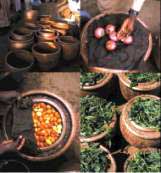Articles
The Reality of Trying to Transform Structures and Processes: Forestry in Rural Livelihoods
This working paper is one of a series that cover practical applications of Sustainable Livelihood (SL) approaches within natural resources management. The papers provide substantial case study material of varied practical experiences, combined with reflection on the emerging findings concerning uses of SL. Some focus on specific types of application of SL approaches (e.g. project design, impact assessment) and some on their application to specific sectors (e.g. water, tourism).
The Role of Watershed Projects in Developing Rainfed Agriculture in India
This report presents findings, conclusions and recommendations about future investments in
watershed development based on a background study by Kerr et al (1998), who conducted a detailed quantitative survey of 86 villages in Maharashtra and Andhra Pradesh covered by a wide variety of watershed projects. They focused on how agricultural productivity and natural resource conditions are determined by watershed projects and a variety of other factors operating in the villages. The study provide evidence regarding past experiences and current approaches, laying the groundwork to search for a way forward for future projects.
Mohammed Bah Abba
Northern Nigeria is an impoverished region where people in rural communities eke out a living from subsistence farming. With no electricity, and therefore no refrigeration, perishable foods spoil within days. Such spoilage causes disease and loss of income for needy farmers, who are forced to sell their produce daily. Nigerian teacher Mohammed Bah Abba was motivated by his concern for the rural poor and by his interest in indigenous African technology to seek a practical, local solution to these problems. His extremely simple and inexpensive earthenware "Pot-in-Pot" cooling device is starting to revolutionise lives in this semi-desert area.
Proposals
Rural Community Development Project at Budge Budge, West Bengal.
In this project report, we will focus on a 'Rural Community Development Project', in which the target community belongs to a minority community, and is located in Budge Budge, West Bengal. The minority and economically backward community would be served the most from the infusion of new technology and the concomitant education and training opportunities. The women would benefit from the social improvements and infrustructural developments that will follow from this project.
Other Categories
Guideline:
DAC Guidelines on Poverty Reduction: September 2000 Draft
The Guidelines provide, in a condensed format, practical information about the nature of poverty and how it is best tackled. They are thus of value to operational staff in the field and at headquarters. They also provide guidance on appropriate policy formulations and priorities, how to work with different partners in developing countries and the international system, and how agencies could best be led, reconfigured and retooled to effectively mainstream poverty reduction and to work in partnership. This information is of use to agency leadership, operational managers, and policy and human resource staff.
Report:
Impact of Watershed Development on Biomass Strategies
A primary objective of this treatise is to present a series of remedial measures based on the experiments and real-life experiences documented by Air Vice Marshal S. Sahni (Retd.), in the course of his ceaseless efforts to implement an integrated scheme for watershed development in Datia and Tikamgarh districts of Madhya Pradesh. Another objective is to develop standardized methodologies for watershed development that may be integrated with the economical and reliable production of biomass for use in the energy sector.
NCSD RIO+10 Assessment: West Bengal Sub-Regional Forum
The RIO+10 Assessment for the West Bengal Sub-Regional Forum was held in the rural township of Bashirhat on November 10th 2001. The main objectives were to(a) exchange experiences and discuss common concerns and issues, (b) consolidate recommendations for action; and (c) explore opportunities for sub-regional cooperation to advance implementation with respect to mutual sustainable development concerns.
|
|
|
| New Arrivals |

Vegetable Cooler
A pot-in-pot device that does not require electricity or any conventional fuels to keep vegetables and drinking water cool in rural, semi-urban and urban environments Costs between Rs. 50 and Rs 120, depending on size and ordering quantities. The usage of the device is shown below:

|
|
|
Watch this space for exciting new offers in solar powered 'vaccine' refrigerators for remote and rural-based communities
|
|
|